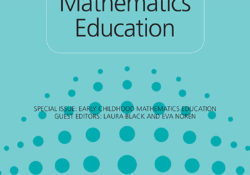tandfonline.com har udgivet en rapport under søgningen „Teacher Education Mathematics‟: ABSTRACT ABSTRACT This qualitative research paper discusses how the material environment of preschool classrooms contributes to early childhood experiences of gender. It applies poststructuralist and posthumanist concepts – primarily Barad’s agential-realism – to analyse ethnographic data extracts drawn from the author’s semi-longitudinal study in a UK nursery. This data focuses on two specific areas of the classroom, the ‘home corner’ and the ‘small world’, and the paper argues that these areas and the objects contained within them can support or challenge/queer gender roles depending on temporal material-discursive conditions. It concludes with specific thinking points for practitioners, arguing that applying these theoretical concepts to explore gender in the early years produces interesting perspectives on how rigid, binary gender roles can be… Continue Reading →
Like this:
Like Loading...
tandfonline.com har udgivet en rapport under søgningen „Teacher Education Mathematics‟: ABSTRACT ABSTRACT The aim of this study was to investigate how the heads of preschool govern teaching in practice through systematic quality work. In the new Swedish Education Act, which came into force on 1 July 2011, the mission of preschools changed because teaching was introduced as a new concept, and preschool teachers were now responsible for teaching. Swedish National Agency for Inspection report that there is a lack of how the concept of teaching is used in preschools. Heads of preschool are crucial for implementing teaching, and a valuable tool for their governing is the systematic quality work which they also are responsible for. This study collected data comprising 120 systematic quality reports from preschools in Sweden, and by… Continue Reading →
Like this:
Like Loading...
eric.ed.gov har udgivet: The majority of early education programs promote children’s learning through a mix of experiences in child- and teacher-managed contexts. The current study examined time spent in child- and teacher-managed contexts and the nature of children’s experiences with teachers in these contexts as they relate to children’s skill development. Participants were preschool children (N = 283, M age = 52 months, 48% girls, 70% Mexican or Mexican American) from families of a lower socioeconomic status. Observations captured children’s time in child- and teacher-managed contexts and experiences with teachers in each context. School readiness was assessed directly and through teacher reports. Research Findings: Time spent in teacher-managed contexts was positively related to children’s academic and social skill development. Experiences in child-managed context predicted vocabulary, math, and social skills when… Continue Reading →
Like this:
Like Loading...
eric.ed.gov har udgivet: Achieving high-quality preschool at scale is challenging; to do so likely entails a combination of program standards, teacher qualifications and compensation, on-site quality monitoring, and professional development (PD). This study aims to examine the impact of investments in PD within the context of an expansion of universal preschool in one of the nation’s largest school districts. We leverage the opportunity provided by a „natural experiment‟ to estimate PD’s effects that embeds an evidence-based math curriculum in interdisciplinary units of study with coaching support on teacher math practices. A total of 95 schools participated in this study (51 treatment and 44 comparison schools). Treatment sites implemented more teacher-led math activities for a longer period compared to control sites. The size and magnitude of the impacts of a curriculum… Continue Reading →
Like this:
Like Loading...
eric.ed.gov har udgivet: The current study, a randomized controlled trial, explores how technology and educational transmedia resources can enhance prekindergarten math teaching and learning in preschools, especially those serving children who may be at risk for academic difficulties due to economic and social disadvantages. This research is part of a multi-year summative evaluation of the CPBPBS Ready To Learn initiative, funded by the US Department of Education. A core aim of the initiative is delivering early math (and literacy) resources on new and emerging digital platforms such as tablet computers, interactive whiteboards, and smartphones, as well as better-established technologies such as computers, video displays, and gaming consoles, and to create learning experiences that leverage the unique capabilities of these various technology platforms. The study’s goal was to understand how the… Continue Reading →
Like this:
Like Loading...
eric.ed.gov har udgivet: Mathematical development processes begin long before school starts and the importance of previous mathematical knowledge for later school achievements is beyond dispute. For a suitable pre-school education, the focus of interest must be to find out which early learning processes prepare children best. In this article, the acquisition of the key concepts of numeracy is presented in a developmental model, which served as framework for a supportive programme for 4-8 year-old children. The research into this intervention shows how development-oriented support of key arithmetic concepts can be constructed and taught systematically. The immediate and sustainable effect of the programme „Mina and the Mole‟ on the mathematical competencies of children has already been demonstrated in an evaluation study of 248 children aged 5-7. Considering the strong language-orientation of… Continue Reading →
Like this:
Like Loading...
eric.ed.gov har udgivet: This paper describes findings from a blocked randomized design (BRD) field study conducted to examine the „Next Generation Preschool Math‟ (NGPM) program’s implementation in preschool classrooms and promise in improving young children’s mathematic learning. NGPM integrates traditional preschool activities with developmentally appropriate technology to support teaching and learning. During development, an evidence-based curriculum design framework and iterative development processes were employed (i.e. design-based research). Research questions guiding this research include: (1) Does experiencing NGPM impact young children’s mastery of subitizing and equipartitioning?; (2) Can the NGPM units feasibly be implemented in preschool classrooms?; (3) Does experiencing the NGPM unit 1 impact young children’s mastery of subitizing?; (4) Does experiencing the NGPM unit 2 impact young children’s mastery of equipartitioning?; and (5) Does experiencing the NGPM intervention improve… Continue Reading →
Like this:
Like Loading...
tandfonline.com har udgivet en rapport under søgningen „Teacher Education Mathematics‟: ABSTRACT ABSTRACT Play-based preschool pedagogy usually relies on informal teaching while policy trends and some research call for increased formalisation of the pedagogy. Using Bernstein’s concepts of classification and framing, this article characterises mechanisms that link evaluation of preschool to the push towards the formalisation of teaching in preschool. Moreover, it is suggested how preschool teaching of mathematics can be conceptualised in a way that widens the pedagogical responsibilities of the teachers to include a broader range of social activities than typically expected. These responsibilities concern how teachers are involved in pedagogical situations, if situations are planned and if the mathematics is a pedagogical goal in the situation or instrumental in some other activity. It is argued that a practice… Continue Reading →
Like this:
Like Loading...
eric.ed.gov har udgivet: The aim of this study was to identify the thoughts of pre-service teachers, who play an important role in the early preschool experience of children in mathematics, towards the concepts of mathematics and education of mathematics with the help of metaphors. The study group of the research consists of a total of 227 pre-service teachers at the Department of Preschool Education, Faculty of Education, Cukurova University in the 2013-2014 academic years. The data of the study were collected by asking pre-service teachers to complete some sentences like „do you think, education of math is like …. in the preschool education; because Math is like …; because….‟. The responses obtained from pre-service teachers were categorized by content analysis. As a result of the study, seven categories created by… Continue Reading →
Like this:
Like Loading...
eric.ed.gov har udgivet: There is a national need for effective interventions to improve school readiness and subsequent achievement in mathematics for students from low-income families. The purpose of this study was to implement and evaluate a 2-year preschool math intervention that began at preschool entry when children were 3 years of age and continued through the end of the pre-kindergarten (pre-K) year. Three principal objectives will be addressed in this presentation: (1) to evaluate the efficacy of a math curriculum for 3-year-olds implemented in the pre-pre-kindergarten (pre-pre-K) year of preschool; (2) to compare the impact of a 2-year math intervention (implemented during pre-pre-K and pre-K years) with a 1-year math intervention (PK) or a business-as-usual control condition on children’s mathematical knowledge at the end of preschool; and (3) to examine… Continue Reading →
Like this:
Like Loading...


